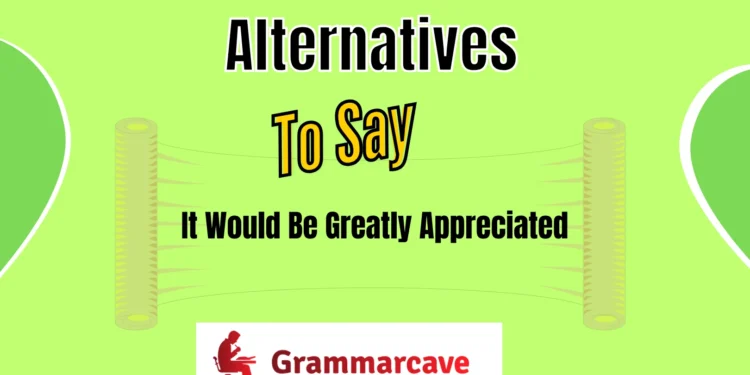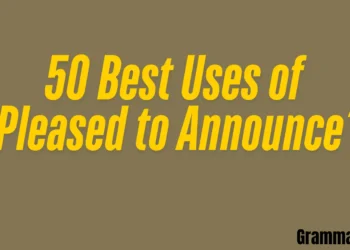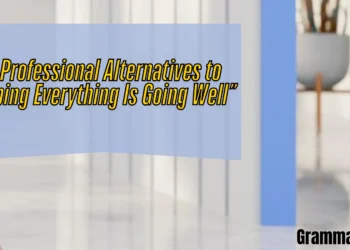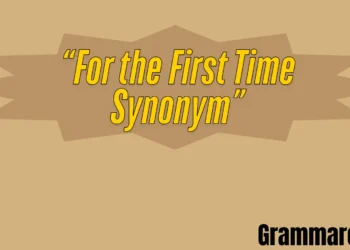The choice of words used to convey a message, such as “thank you” or “request,” can significantly influence its reception. The expression “it would be greatly appreciated” is polite, neutral, and appreciative, but switching things up figuratively can sometimes make it more authentic.
As a recipient of appreciation in emails or other forms of electronic communication, utilizing varying ways of saying thank you can bring extra warmth to the interaction. Using different phrases permits the sender to express their thoughts with gentility and honesty, greatly enhancing the recipient’s experience.
What does “It would be greatly appreciated” mean?
This phrase is a courteous and careful approach to seeking assistance while expressing appreciation. By saying “would be appreciated,” the speaker softens the request to be “a favor” instead of a demand. For example: “Would it be possible for you to review the document by Friday?” It’s most useful in the workplace, in emails to clients, coworkers, or superiors, but it can sound stilted and limiting in informal conversations. Just don’t overdo it, or it may come across as insincere. Save it for times when sincere gratitude is appropriate.
Is It Professional/Polite to Say “It Would Be Greatly Appreciated”?
Indeed, “It would be greatly appreciated” works well in formal and business settings. It helps soften requests by focusing on gratitude instead of demanding something in return (for example, “Your feedback by EOD would be greatly appreciated”). This would work well during emails, client conversations, or even when talking to superiors. The phrase does have some cons, though. Its passive nature makes it overly formal or distant in collaborations and casual work environments. If empathy and warmth are essential, this phrase should be avoided in favor of “Your feedback would be appreciated” or “I’d appreciate your help!” as these foster good dialogue.
Advantages and Disadvantages of using “It would be greatly appreciated”:
Advantages:
- Politeness and formality: They’re appropriate ways to soften a request and express deference and respect, particularly in professional or unfamiliar contexts (“I would very much appreciate your feedback.”
- Psychological Softening: By framing appreciation as conditional (“would be”), it subtly acknowledges the recipient’s choice, making the request less demanding.
- Versatility: It can be tacked onto the end of many written requests (emails, messages) without complex restructuring.
- Positive Framing focuses on appreciation rather than just demand, potentially improving recipient receptiveness to minor asks.
Disadvantages:
- Passivity & Indirectness: It avoids clear responsibility (Please do X) and can sound weak, hesitant, or lacking authority, especially from managers.
- Vagueness: The document fails to explicitly state what action is needed (“It” refers back vaguely), which can be potentially confusing.
- Overly Formal/Impersonal: Can feel stiff, cold, or transactional in casual settings, urgent situations, or with close colleagues, hindering genuine connection.
- Potential for Presumption: This implies that the recipient will comply, which can feel presumptuous for significant requests, especially without prior rapport.
- Lacks Warmth & Specific Gratitude: It’s future-focused (would be) and generic, making it unsuitable for thanking someone for something already done – a simple Thank you is better.
What Tone Does it Carry? “It would be greatly appreciated”?
“It would be greatly appreciated” carries a polite, formal, and subtly deferential tone. It emphasizes the recipient’s power to fulfill the request by framing the appreciation as conditional on their action, creating psychological distance. While courteous, this construction can also come across as passive, indirect, or impersonal, softening the request but potentially diminishing the speaker’s authority or urgency. Its formality suits professional or unfamiliar contexts but risks sounding stiff, transactional, or even slightly presumptive (assuming compliance) in casual or urgent situations. Ultimately, it prioritizes politeness over directness or warmth.
When to avoid saying, “It would be greatly appreciated.”
This phrase gets on my nerves when it waters down necessary directness, such as by giving clear instructions (“Please submit this by 5 PM” is better without the please) or making urgent/critical requests where compliance is not negotiable. It’s also frequently unnecessary and far too obsequious in a run of mill back and forth exchanges with coworkers on which a simple “Thanks” or “Please” should suffice, and can come across as insincere or even passive-aggressive if the ask is a demand or if you have a lot more power than the person receiving the request.
Professional Alternatives to “It would be greatly appreciated.”
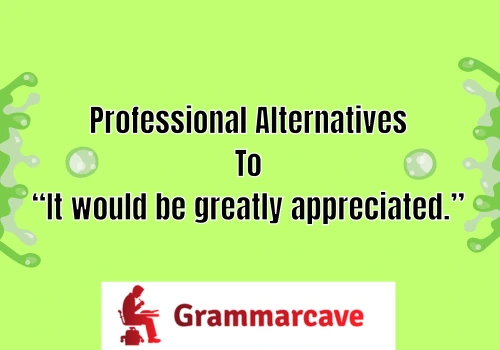
1. This would be invaluable.
Meaning: This isn’t just helpful; it’s like finding gold dust for me – truly irreplaceable.
Definition: Highlights that the help is so unique or critical that its worth cannot be measured.
Explanation: You’re expressing that their contribution fills a gap nothing else could.
Example: Your perspective on this legal clause would be invaluable – your expertise is unmatched here.
Best for: Requesting rare skills, specialized knowledge, unique access, formal proposals, or critical projects.
Worst for: Routine tasks (“Could you proofread this email? It would be invaluable.”)—it feels overblown.
Tone: Deeply respectful, emphasizes uniqueness and critical need. It can feel intense or formal.
2. Your help would make a significant difference.
Meaning: “Your actions won’t just help; they’ll genuinely move the needle.
Definition: Stresses that the help would result in a meaningful and noticeable impact.
Explanation: It’s about the positive outcome or change their help would enable.
Example: Volunteering at the shelter on Saturday would make a significant difference for the animals arriving that day.
Best for: Bigger goals, concrete problems, team efforts, or causes with clear outcomes.
Worst for: Minor personal favors where the difference feels exaggerated.
Tone: Appreciative, outcome-focused, collaborative. Warm or neutral, depending on context.
3. I’d be incredibly grateful.
Meaning: I would feel a massive wave of personal thankfulness over me.
Definition: Expresses sincere, heartfelt gratitude that’s personal and meaningful.
Explanation: Centers on your emotional reaction to their generosity or effort.
Example: If you could water my plants next week, I’d be incredibly grateful—I won’t worry!
It is best for personal favors, stress relief, and emotional support. It suits colleagues, friends, and family.
Worst for: Small or transactional asks (“Please cc me.”) – sounds overly dramatic.
Tone: Warm, sincere, personal, vulnerable. Relatable and human.
4. This would be tremendously helpful.
Meaning: “This would lift a huge weight off my shoulders / make this task so much easier.”
Definition: Indicates the help would greatly ease or accelerate the task.
Explanation: Focuses on practical relief or benefit from their contribution.
Example: Getting those sales figures by noon would be tremendously helpful for finishing this report on time.
Best for: Tasks that reduce workload, provide essential input or simplify processes.
Worst for: Trivial tasks (“Handing me that stapler”) – sounds over the top.
Tone: Appreciative, practical, warm, and task-focused. Versatile.
5. Your support would be deeply appreciated.
Meaning: I would feel profound, heartfelt thanks for you standing with me/backing me up.
Definition: Emphasizes meaningful gratitude, often with emotional or moral support.
Explanation: This goes beyond task completion to imply solidarity or shared values.
Example: As I present this new idea to the team, your support would be deeply appreciated.
Best for endorsements, backing during presentations, and emotional or moral support.
Worst for: One-off or casual favors – sounds too formal or heavy.
Tone: Sincere, heartfelt, respectful. Emphasizes emotional depth.
6. It would be a huge relief.
Meaning: This would take a massive worry off my mind / let me finally breathe easy.
Definition: Highlights how much stress or anxiety would be eased by their help.
Explanation: Personal and vulnerable – shows the emotional weight you’re carrying.
Example: It would be a massive relief if you could confirm the flight details tonight – I’ve been stressing about it!
Best for: Solving stress-inducing issues, relieving pressure or uncertainty.
Worst for: It feels like emotional oversharing if they’re unaware of your stress or for minor tasks.
Tone: Vulnerable, honest, emotionally open. Builds trust and connection.
7. This would be a game-changer.
Meaning: This wouldn’t just help; it would completely flip the script and create a massive win.
Definition: Declares the action would fundamentally improve the situation.
Explanation: Reserved for contributions that cause major positive shifts.
Example: Securing that investor would be a game-changer for our startup – we could launch properly!
Best for: Transformative help, breakthrough opportunities, large-scale change.
Worst for: Regular or incremental help – sounds exaggerated.
Tone: Energetic, optimistic, ambitious. Often informal and enthusiastic.
8. I’d be forever grateful.
Meaning: “My thanks wouldn’t fade; I’d carry this feeling of deep appreciation for a very long time.”
Definition: Expresses long-lasting, heartfelt gratitude.
Explanation: Suggests that their action has lasting personal value to you.
Example: If you could be my reference for this dream job, I’d be forever grateful – it means the world to me.
Best for: Life-changing help, major favors, or emotionally significant actions.
Worst for: Professional or low-effort requests – can feel excessive or melodramatic.
Tone: Profoundly sincere, deeply personal. Use sparingly for powerful impact.
9. This would be immensely beneficial.
Meaning: “This would bring huge advantages and positive results all around.
Definition: Emphasizes measurable value and advantages from the help.
Explanation: Appeals to logic and outcome, often for group or project gain.
Example: Sharing your marketing data would immensely benefit our joint research project’s accuracy.
Best for: Strategic collaborations, formal proposals, and mutual goals.
Worst for Personal or emotional favors – comes off as cold or transactional.
Tone: Appreciative, formal, and professional.
10. Your prompt attention to this is requested.
Meaning: “This is urgent; please prioritize it.
Definition: A polite but firm call for immediate action.
Explanation: Signals urgency without being abrasive. Assumes the recipient should act quickly.
Example: “Invoice is overdue. Your prompt attention to this is requested.
Best for: Time-sensitive issues (legal deadlines, payments, system outages).
Worst for: Casual requests, creative feedback,
Tone: Urgent, formal, slightly authoritative.
11. We request your assistance with
Meaning: We need your help on this specific task.
Definition: A formal, neutral appeal for support.
Explanation: Professional and unambiguous. Focuses on collaboration over demand.
Example: “We request your assistance with the compliance audit documentation.
Best for: Cross-departmental projects, regulatory tasks, and client escalations.
Worst for Peer-to-peer favors.
Tone: Respectful, collaborative, professional.
12. Your cooperation is solicited.
Meaning: “We’re formally asking for your compliance.
Definition: A bureaucratic phrase emphasizing voluntary adherence.
Explanation: Common in policy enforcement. It is polite but carries an expectation of agreement.
Example: “Your cooperation is solicited in adhering to the new security protocols.
Best for: Policy rollouts, mandatory training, procedural changes.
Worst for: Creative collaboration.
Tone: Official, procedural, detached.
13. We would be indebted for your support.
Meaning: “Your help would be a significant favor we won’t forget.
Definition: Expresses deep gratitude in advance for critical help.
Explanation: Formal but warm. Implies reciprocity or lasting appreciation.
Example: “Sponsorship would ensure the event’s success. We would be indebted for your support.
Best for: High-impact favors, Sponsorship asks, and executive-level requests.
Worst for: Routine tasks (feels overly dramatic).
Tone: Grateful, earnest, weighty.
14. We acknowledge the value of your contribution.
Meaning: “We recognize your expertise/role in this.
Definition: Validates the recipient’s importance before asking.
Explanation: Builds goodwill by affirming their significance upfront.
Example: “We acknowledge the value of your contribution and invite your input on the strategic plan.
Best for: Engaging experts, senior stakeholders, or valued team members.
Worst for: Transactional requests (“Please submit your timesheet” – feels insincere).
Tone: Flattering, diplomatic, strategic.
15. Please oblige by [action]…
Meaning: Kindly comply with this requirement.
Definition: A formal, slightly old-fashioned appeal for compliance.
Explanation: Polite but authoritative. Often used in compliance or legal contexts.
Example: Please oblige by signing the attached NDA before the meeting.
Best for: Contractual obligations, regulatory steps, formal agreements.
Worst for: Collaborative projects.
Tone: Courteous yet commanding, traditional.
16. Your compliance will be noted.
Meaning: “We’re tracking whether you follow through.
Definition: A subtle reminder that adherence is monitored.
Explanation: Polite but implies consequences for non-compliance. Use sparingly.
Example: “Complete the training by Friday. Your compliance will be noted.
Best for: Mandatory training, policy acknowledgments, audit trails.
Worst for: Voluntary tasks.
Tone: Official, monitoring, low-key stern.
17. We seek your assistance on this matter.
Meaning: “We’re formally inviting you to help resolve this.”
Definition: A structured, professional call to action.
Explanation: Focuses on the matter (problem/task) rather than the person. Neutral and respectful.
Example: “The client has escalated the issue. We seek your assistance on this matter.”
Best for: Crisis management, complex problems, cross-functional resolutions.
Worst for: Simple or routine asks (overly formal).
Tone: Focused, procedural, unemotional.
18. This warrants your consideration.
Meaning: “This issue deserves your brainpower/attention.
Definition: Asserts that the topic is worthy of their focus.
Explanation: Validates the recipient’s time while signaling importance.
Example: The budget variance is significant. This warrants your consideration.
Best for senior leaders, complex decisions, and high-impact proposals.
Worst for: Minor updates.
Tone: Respectful, weighty, persuasive.
19. We are hopeful for your favorable response.
Meaning: “We’re optimistic you’ll agree.
Definition: Expresses positive expectation for agreement.
Explanation: Formal and slightly deferential. Softens a direct ask with optimism.
Example: “We propose a partnership and are hopeful for your favorable response.
Best for: Proposals, partnership requests, contract negotiations.
Worst for: Demands or non-negotiable deadlines (feels naive).
Tone: Optimistic, diplomatic, polished.
20. This merits your attention.
Meaning: This is important enough for you to prioritize.
Definition: A formal claim of significance.
Explanation: Assumes the recipient will agree the topic is critical. Confident and direct.
Example: The security breach merits your attention immediately.
Best for: High-stakes issues requiring leadership action (risks, opportunities).
Worst for: Low-priority items (feels presumptuous).
Tone: Authoritative, urgent, no-nonsense.
21. We rely on your support.
Meaning: “Our success depends on you.
Definition: Asserts dependency for a critical outcome.
Explanation: High-stakes and slightly vulnerable. Use only when true.
Example: “The launch timeline is tight. We rely on your support to meet the deadline.
Best for mission-critical projects, executive Sponsorship, and all-hands efforts.
Worst for: Low-impact tasks or new relationships (feels manipulative).
Tone: Weighty, trusting, slightly pressured.
22. Thank you for [action].
Meaning: Directly acknowledges the action as if it’s already done.
Definition: A forward-looking “thank you” assuming cooperation.
Explanation: This expression expresses confidence and appreciation upfront. Depending on the context/relationship, it can feel warm or slightly presumptive.
Example: Thank you for sending the report by EOD.
Best for: Routine requests with colleagues you trust, confirming agreed actions.
Worst for: Big favors and initial requests to superiors/clients (can seem presumptuous).
Tone: Confident, appreciative, slightly informal.
23. Thanks in advance.
Meaning: Thanks someone before they’ve done the requested action.
Definition: A preemptive expression of gratitude.
Explanation: Use EXTREMELY cautiously. It is easily perceived as presumptuous, passive-aggressive, or closing the door on refusal. It is best only when compliance is virtually guaranteed (e.g., a scheduled task).
Example: “Could you please unlock the conference room? I appreciate any help you can provide.
Best for: Minor, guaranteed actions with peers you know well.
Worst for: Important requests, superiors, clients, cold requests, ambiguous tasks.
Tone: Risky. Can sound efficient, casual,
24. Thanks for your help.
Meaning: General appreciation for assistance.
Definition: A broad, warm thank you for your support.
Explanation: Versatile and safe. Expresses appreciation without assuming the specific outcome. Works well before, during, or after help is given.
Example: “I’m stuck on this formatting issue. Thanks for your help!”
Best for: Almost any situation where someone offers or provides help.
Worst for: When you need to emphasize the specific action required.
Tone: Warm, genuine, appreciative, collaborative.
25. Many thanks for [action].
Meaning: A more emphatic “thank you” for a specific future action.
Definition: Expresses stronger appreciation.
Explanation: More formal and emphatic than “Thank you for [action].” He still assumes compliance but with heightened gratitude.
Example: “Many thanks for carefully reviewing the proposal draft.
Best for: Important tasks where you want to emphasize your appreciation (peers, collaborators).
Worst for: Trivial tasks (can sound overblown), superiors/clients where presumption might be risky.
Tone: Warm, appreciative, slightly more formal/emphatic.
FAQs
Q1: When should I use this phrase?
A: When making requests where you want to emphasize politeness (e.g., asking for help, follow-ups, or favors).
Q2: Does this phrase sound too deferential or submissive?
A: It can be in specific contexts. For equal colleagues, a simpler “I’d appreciate your help with…” may sound more confident.
Q3: Is it suitable for internal team communication?
A: Yes, but with peers, a more casual “Thanks in advance for your help!” may feel more natural.
Q4: Can I use it in subject lines?
A: Avoid—it’s too long. Use action-oriented lines like “Request: Project Feedback Needed” instead.
Q5: What are stronger alternatives?
A: I’d be grateful if you could. “Thank you in advance for…” (Caution: Can seem presumptuous if overused)
Q7: Is this phrase appropriate for clients?
A: Yes, especially when asking for feedback or input. I would greatly appreciate it if you could review the proposal by Friday.
Q8: Can I use it with senior leadership?
A: Yes, but be concise: “Your guidance on this would be greatly appreciated.
Conclusion
The polite and dignified phrase “It would be greatly appreciated” is used when making formal requests, communicating with clients, or greeting someone in advance. Since it works well when appearing polite, it should only be used in moderation to avoid appearing overly formal or passive. In casual or urgent situations, simpler alternatives like “I’d appreciate your help with or *“Could you please? It may sound more natural. Always pair it with clear action items to maintain professionalism. When used thoughtfully, this phrase reinforces respect and collaboration in workplace communication.

